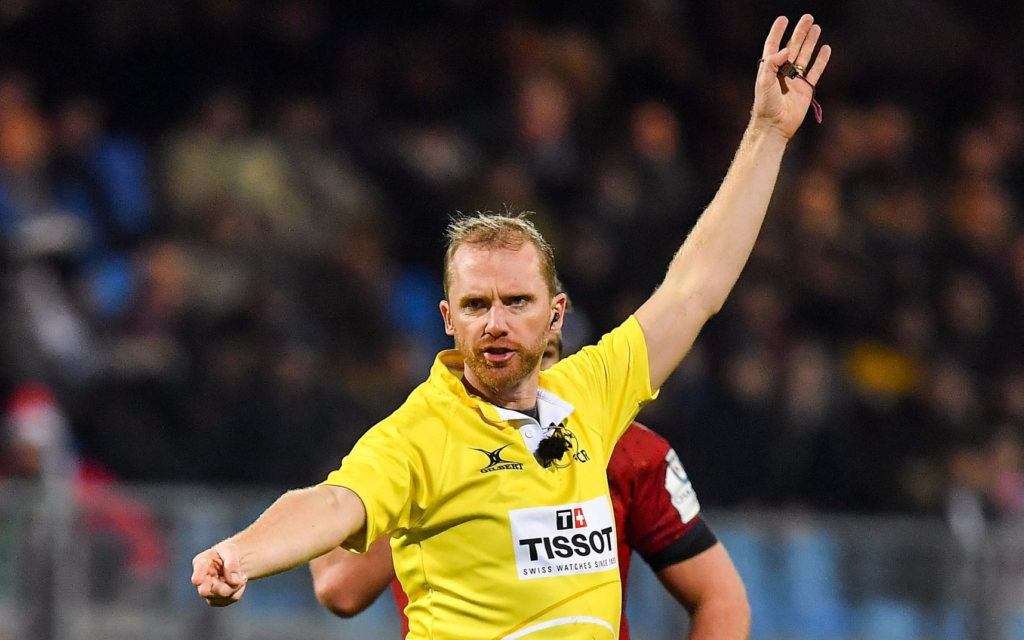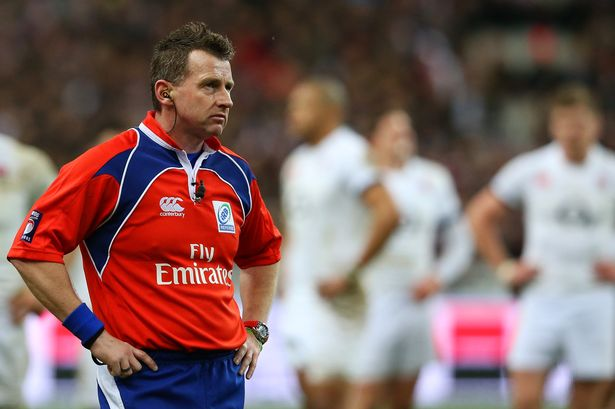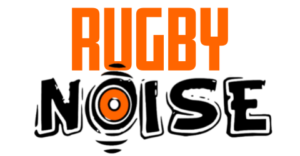Like all other sports, rugby has its own officials who are charged with enforcing the rules of the game. Every rugby union match is governed by three officials – one referee and two assistant referees or touch judges. Additional officials may be brought on to assist the three main ones. A good example is the television match official (TMO) who observes the match on TV screens that offer multiple camera angles of a fixture and assists the on-field referee(s) to make correct decisions. Among the many officials, a select few have set themselves apart and garnered reputations as the best on account of their sound and stellar decision-making.
Who is the top rugby referee? The top rugby referee is arguably English referee and barrister Wayne Barnes, who has officiated at three Rugby World Cups and over 200 Premiership fixtures. He is set to equal fellow top referee Nigel Owens’ test appearance record early in November 2022 and surpass it later on in the same month. Barnes is also expected to be one of if not the top referee at the upcoming 2023 Rugby World Cup.

A Brief History of Rugby Officials
In its early years in the mid-1800s, rugby was played without referees. Rather, the captains of the respective teams agreed on the rules they would follow beforehand and resolved whatever disputes arose over the course of the match.
Many historians argue that it is this now-defunct arrangement that led to the development of certain rules such as the one on advantage since no captain would dismiss any benefit his side would be handed out of their opponent’s mistakes.
Referees were later officially made a part of the game upon the formation of the International Rugby Board (IRB) in 1892. Further changes made to the Laws of the Game created provisions for one main referee and two assistants.
In the execution of their duties, rugby referees normally have various “tools of the trade”. The common ones are cards (red and yellow) to punish infringements, a watch, and a scorecard to keep tabs on the game’s development, and a coin to decide possession at the beginning of matches.
Other tools include a uniform to distinguish them from either team, communication equipment (an earpiece and a microphone), and cleats/boots to aid their movement on the field of play. Referees also carry a whistle and flag to assist in their communication with players and their fellow officials.
The Rise of Wayne Barnes
Barnes was born in west Gloucestershire, England, and took to rugby at the tender age of eight like many of his peers. The then-young Englishman discovered he had a passion for officiating in his mid-teens and first learned the trade from the Gloucester & District Referees.
The budding official then joined the Norfolk Referees Society and the London Society of RFU Referees, later becoming the youngest referee to be appointed to the Panel of National Referees at only 21 in 2001.
Four years later, Barnes became a professional referee and had his first test in charge at the 2006 edition of the Pacific Five Nations, where he went on to officiate another two matches. Prior to his debut, Barnes perfected his craft in the Rugby Sevens circuit from late 2003 to early 2005.
Barnes gained worldwide recognition after being selected to officiate the 2007 Rugby World Cup. Despite performing his duties exceptionally well, the 2019 World Rugby Referee of the Year was the target of abuse and threats by a section of New Zealand fans who were unhappy with the All Blacks’ exit at the quarter-finals stage which Barnes had officiated.
Known as a tough but fair referee, Barnes has been known to demand respect from players and has gone on record severally to punish unbecoming conduct. One of his notable decisions was when he sent off former Northampton skipper Dylan Hartley in their English Premiership finals clash against Leicester Tigers for aiming obscenities at him.
Worthy “Opponent”
Barnes often draws comparisons to ex-international rugby union referee Nigel Owens, who recently retired from officiating in late 2022 after an illustrious officiating career that lasted almost two decades.
Owens, who took up refereeing up refereeing in 1987 in his teens, did so upon the advice of his sports teacher. Among the various competitions, Owen has officiated include the EPCR Challenge Cup, the Pro 14, and the Heineken/Champions Cup.
The Welshman also officiated in four Rugby World Cups from 2007 to 2019. The 2015 World Rugby Referee Award announced his retirement from international duty in December 2020 but still remains active in Welsh Rugby circles.

Elite Class
Aside from Barnes and Owens, there are a number of other top referees who are charged with officiating rugby matches. They include South Africa’s Jaco Peyper, who has officiated the 2015 and 2019 Rugby World Cups as well as multiple Super Rugby and Rugby Championship matches.
New Zealand’s Ben O’Keeffe is also considered one of the best rugby referees in the world. The practicing Ophthalmologist became the youngest referee to officiate a Rugby World Cup match after taking charge of a group-stage clash between Australia and Fiji in 2019.
O’Keeffe further officiated two other pool matches in the same tournament and assisted in several fixtures in the knockout stages. O’Keeffe has also refereed Super Rugby and Six Nations Championship matches.
England’s Luke Pearce also belongs on this exclusive list. The Wales-born whistleblower is a regular in the English Premiership, EPCR Challenge Cup, and European Rugby Champions Cup. Pearce also received the nod to showcase his skills at the 2019 Rugby World Cup, where he had a decent outing by all standards.
Rounding off this list is Australia’s Angus Gardner, who has officiated over 90 Super Rugby matches and appeared in both the 2015 and 2019 Rugby World Cups as an assistant referee and a referee respectively. The 2018 World Rugby Referee of the Year award winner was initially a promising rugby player before his career unceremoniously ended after he was diagnosed with a hereditary disc condition.
Barnes nevertheless remains the leader of the pack and is set to be the first referee in history to officiate 101 international tests. His consistency has earned him the respect of his peers, who have described him as “a great team player”, “a student of the game” and “someone who is respected by players, coaches, and fans alike”.
